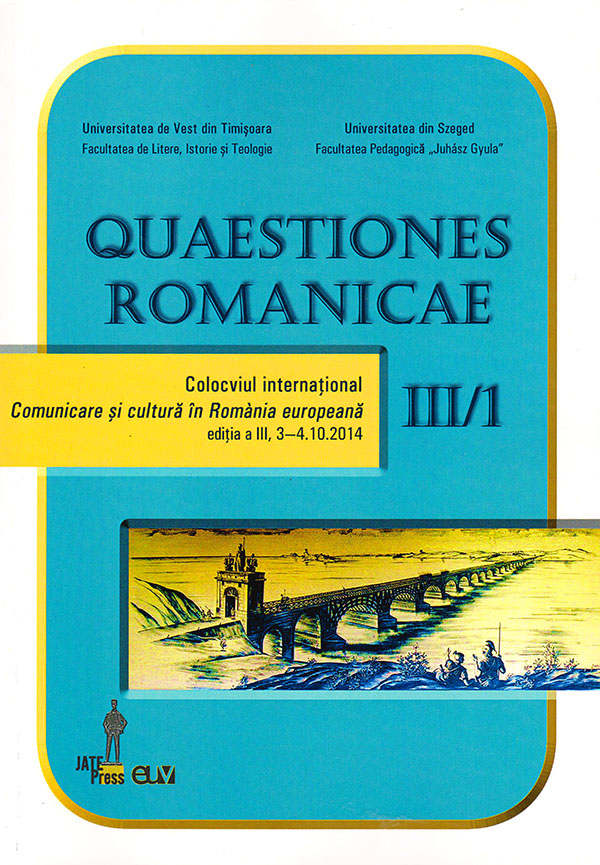Demers identitar naţional în poezia română din Basarabia: momentul '89
Abstract: (The National Identity Demarche in the Romanian Poetry of Bessarabia: the '89 momentum): During the period of 1987-1989 the Romanian poetry in Bessarabia, located under the sign of concrete historical and political imperatives , attested an expansion of the civic that worsened during events of national revival, which led to the advancement of the glotonim „Romanian language” instead of „Moldovan language”, to the substitution of the Cyrillic alphabet with the Latin alphabet , the recognition of the tricolor flag as the national flag and finally to the identification of Moldovans as Romanians. Being rather fertile, the historico-political context boosted the poetic spirit, creators of various generations assuming themselves the role of the tribunes, having produced a poetry employed to illustrate the ideological beliefs, especially the patriotic sentiment, " the spiritual index of a hot relationship that the poet maintained with the community in which he lives "(Stefan Augustin Doinaş). The exaltation of the idea of national consciousness in the creation of Grigore Vieru, Ion Vatamanu, Leonida Lari, Nicolae Dabija, Ion Hadirca and others inherently led to the coagulation of a national identity demarche, which involved the revival of the concepts of Romanism, Roman, Latin, forbidden with hostility during the communist regime. The poetry of the '89 momentum was fueled by the message embedded in occasional texts, spoken at meetings or published in periodicals, texts that reminded about the Latin origin of the natives, their belonging to the Romanian nation, the value of the past history and the national folklore , etc. The new dimensions of the Romanian poetry in the Bessarabian perimeter reveals not only the persistence of the feeling of national identity in the nobility layers, but also the beggining of the recovery process of the Romanian condition by local population, damaged brutally during history.
Keywords: identity , demarche, lyrics, Romanism, Romanity, Latinity, occasional.
Rezumat: În perioada 1987-1989, poezia română din Basarabia, situată sub semnul unor imperative istorice şi politice concrete, atesta o expansiune a civicului, acutizat în timpul evenimentelor de renaştere naţională, care au condus la avansarea glotonimului de limbă română în loc de limbă moldovenească, la substituirea grafiei chirilice cu cea latină, la oficializarea tricolorului ca drapel de stat, în fine, la identificarea basarabenilor drept români. Fertil, contextul istorico-politic a impulsionat spiritul poetic, creatori din diverse generaţii, asumîndu-şi rolul de tribuni, au produs o lirică angajată, ilustrare a convingerilor ideologice, în special, a sentimentului patriotic, "indicele sufletesc al unui raport fierbinte, nemijlocit, pe care poetul l-a întreţinut cu comunitatea în care trăieşte" (Ştefan Aug. Doinaş). Exaltarea ideii de conştiinţă naţională în creaţia lui Grigore Vieru, Ion Vatamanu, Leonida Lari, Nicolae Dabija, Ion Hadîrcă ş. a. a condus, în mod inerent, la coagularea unui demers identitar naţional, care a presupus revigorarea conceptelor de românism, românitate, latinitate, interzise cu ostilitate în timpul regimului comunist. Poezia momentului '89 a fost alimentată de acest mesaj, încorporat în texte ocazionale, rostite la mitinguri ori publicate în periodice, texte în care erau reactualizate originea latină a băştinaşilor, apartenenţa lor la neamul românesc, valorile istoriei şi ale folcloruluii naţional etc. Noile dimensiuni ale liricii române din perimetrul basarabean relevau nu doar persistenţa sentimentului de neam în conştiinţa oamenilor de cultură de aici, dar şi începutul procesului de recuperare, de către populaţie, a condiţiei româneşti, deteriorată cu brutalitate de istorie.
Cuvinte-cheie: identitate, demers, liric, românism, romanitate, latinitate, ocazional.
